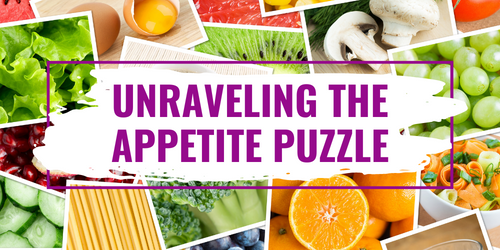The human appetite is an intricate interplay of physiological, psychological, and environmental factors that dictate our desires and preferences for food. From hormonal fluctuations to emotional states and lifestyle choices, understanding the forces that govern our appetite is crucial for maintaining a harmonious and healthy relationship with food. In this newsletter, I'll explore the factors that can stimulate or suppress hunger while exploring the science and personal experiences that shape eating behaviors. By gaining insight into these influences, you'll be empowered with the knowledge and tools to cultivate a more mindful approach to eating. Keep reading to explore the factors that impact your appetite and discover the keys to unlocking a healthier and happier relationship with food.
-Stephanie
|
|
|
10 Factors that Impact Your Appetite
|

Whether you're looking to manage weight, improve overall health, or develop a deeper connection with your body's natural cues, understanding what impacts your hunger and satiety levels will empower you in how you fuel and nourish yourself.
- Hormones: Hormonal changes, such as fluctuations in ghrelin (the hunger hormone) and leptin (the satiety hormone), can influence appetite and feelings of hunger or fullness. Understanding the nutrition and lifestyle factors that impact ghrelin and leptin will help you know how to support healthy hormone balance.
- Emotional Health and Stress: Emotional states associated with stress, anxiety, depression, grief, and boredom can lead to emotional eating or loss of appetite. Some people may eat more during times of distress, using food as a way to cope with feelings. In contrast, others may lose their appetite during stress or grief. Eating too much or not enough can have unwanted health consequences. If you're experiencing a change in your appetite due to emotional stress or distress, working with a registered dietitian can help you find the right balance for nourishing and fueling yourself.
- Sleep: Lack of sleep or poor sleep quality can disrupt hormone regulation, leading to increased ghrelin levels and decreased leptin levels, which may result in heightened appetite. Empower yourself to fuel right by getting 7-9 hours of quality sleep each night.
- Medical Conditions: Certain conditions may increase or decrease your appetite. Bacterial or viral illnesses, hypothyroidism, cancer, and Parkinson's disease are some diseases associated with reduced appetite. Hyperthyroidism, Graves' disease, bulimia, binge eating disorder, hypoglycemia, and diabetes can increase appetite.
- Medications: It's no secret that certain medications can either increase or decrease your appetite. Awareness of the potential side effects of your prescriptions is the first step in understanding how to empower yourself not to eat too much or too little.
- Exercise: Physical activity affects one's energy, nutrient needs, and appetite. While some people experience increased hunger after exercise, others may have a decrease in their appetite. The intensity, duration, and heat conditions can impact your post-workout appetite; working with a sports dietitian can help customize a plan that meets your energy needs.
- Environmental and Social Factors: Surroundings, social situations, and cultural influences can influence appetite and eating behaviors. Practicing mindful eating can help you listen to your body and pay attention to your body's hunger and fullness signals. Mindful eating and awareness of hunger and fullness cues can help regulate hormones that impact your appetite.
- Meal Timing and Frequency: Irregular eating patterns or skipping meals can impact hunger and appetite. Stick to regular mealtimes and avoid prolonged periods of fasting.
- Food Choices: The types of foods consumed can impact appetite and satiety. Studies have found that a diet high in protein and fiber will promote fullness. In contrast, a high intake of processed or sugary foods may increase appetite.
- Age and Metabolism: Age-related changes and differences in metabolism can affect appetite and hunger levels.
Navigating through the maze of hormones, emotions, and external cues that impact your appetite, can be complex and confusing. If you are interested in exploring this topic deeper, reach out to schedule a consult.
|
|
|
Balancing Ghrelin and Leptin
|

Balancing ghrelin and leptin is essential for maintaining a healthy appetite and promoting overall well-being. Here are some tips to help achieve this balance:
- Engaging in regular physical activity can help reduce ghrelin levels and enhance leptin sensitivity, resulting in a positive impact on appetite regulation.
- Include foods rich in protein and fiber to promote satiety and help regulate hormone levels. Protein-rich foods include lean meats, fish, legumes, and dairy. Fiber-rich foods include fruits, vegetables, beans, legumes, and whole grains.
- Stay hydrated. Dehydration can sometimes be mistaken for hunger. Drinking adequate water throughout the day can help prevent unnecessary snacking or overeating.
- Manage stress. High-stress levels can disrupt appetite-regulating hormones—practice stress-reduction techniques such as meditation, yoga, or deep breathing exercises.
- Limit foods high in added sugar and processed foods. High sugar and processed food consumption can lead to imbalances in hunger hormones. Opt for whole, nutrient-dense foods to support hormone balance.
- Avoid extreme dieting. Overly restrictive diets can disrupt hormone balance and lead to unhealthy eating patterns.
- Prioritize self-care. Taking care of your overall well-being can positively impact hormone regulation. Adequate self-care, relaxation, and a positive mindset can promote hormone balance.
Remember, hormone regulation varies from person to person, and finding a balance that works for you is essential. Adopting a holistic approach that includes healthy eating habits, regular exercise, and managing stress can go a long way in supporting the balance of ghrelin and leptin and promoting a harmonious relationship with food and your body.
|
|
Featured Recipe
Basil & Cherry Tomato Cannellini
|

Ingredients:
- 1 cup cherry tomatoes
- ½ red onion, diced
- 4 Tbsp extra virgin olive oil
- 1 bunch fresh basil, chopped
- 2 - 15 ounce cans of cannellini beans, drained
- Splash of white wine
- Salt and pepper to taste
Directions:
Heat oven to 350 F.
Put tomatoes, onions, and olive oil in a baking dish for about 20 minutes or until split and softened. While the tomatoes are baking, mix basil, beans, and wine in a separate bowl—season with salt and pepper. Combine bean mixture with baked tomatoes and place in the oven for about 10 minutes. Serve warm.
Serves 4
Nutrition per serving: 289 calories, 14 grams fat, 2 grams saturated fat, 0 mg cholesterol, 250 mg sodium, 27 grams carbohydrates, 12 grams fiber, 10 grams protein
|
|
|
Be Inspired
|
|

|
|
|
About SO Nutrition
|
 Stephanie Leipprandt Ouellette, MBA, RDN, LD
Stephanie Leipprandt Ouellette, MBA, RDN, LD Stephanie has been working in the field of nutrition and dietetics since 1995. She earned a Bachelor of Science degree in Dietetics from Michigan State University, completed an Approved Pre-Professional Practice Program at Western Michigan University and earned a Master of Business Administration from Baker College. She’s been a Registered Dietitian Nutritionist since 1996 and licensed in Texas since 2007. In 2008, Stephanie earned her certification in Childhood and Adolescent Weight Management. Stephanie has extensive clinical & managerial experience, both in corporate settings and in the community. Now she wants to share her knowledge with you, because most (if not all) nutritional habits begin at home.
Stephanie and her family reside in Katy, Texas
|
|
| |
Copyright © 2023 Customized Nutrition Newsletters, All rights reserved.
|
|
| |
|
|